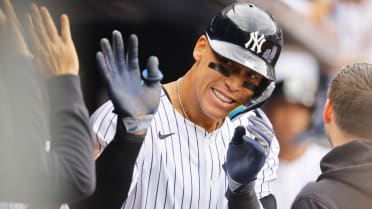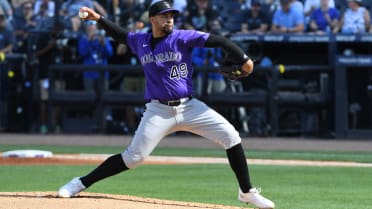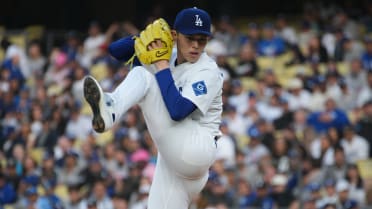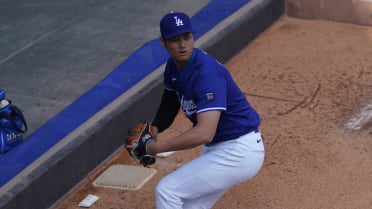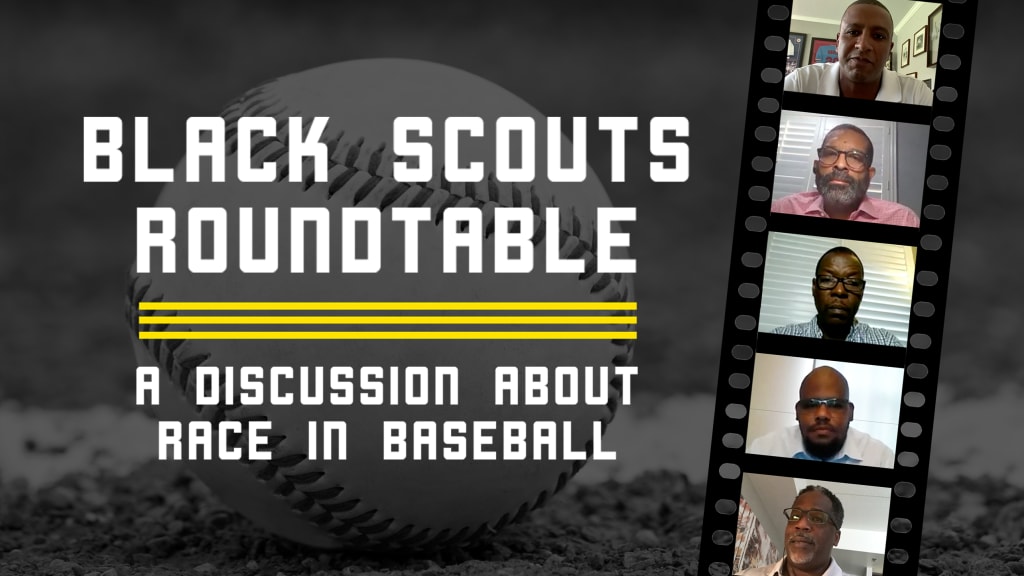
The United States continues to grapple with the systemic racism that has come more to the fore after the killings of George Floyd and Breonna Taylor by police, and, more recently, the shooting of Jacob Blake. As the country tries to find ways to address these injustices, one of its greatest institutions, baseball, has also been working to find ways to combat inequality.
Much has been written about the relative lack of Black players in the game, as well as the nominal representation in front offices. The league has just two Black heads of baseball operations -- the White Sox’s Ken Williams and the Marlins’ Michael Hill. There are only two Black scouting directors, the Braves’ Dana Brown and the Twins’ Sean Johnson. Jared Banner of the Mets and the Indians’ James Harris are the lone Black farm directors in the game.
MLB.com convened a roundtable of five Black scouts, with a vast array of experience, to discuss how they view the game they’ve devoted their lives to in the current landscape. The panelists were as follows, listed with the number of years they have worked in baseball operations, either as a scout or in player development.
• Chip Lawrence, Padres national crosschecker (20)
• Jaron Madison, Cubs special assistant to the president/GM (19)
• Deron Johnson, Twins senior advisor, scouting (27)
• Steve Williams, Pirates pro scouting director (33)
• James “Bump” Merriweather, D-backs national crosschecker (28)
The conversation began around players, especially at the amateur level, and what the obstacles have been to getting more people of color playing. The panel brought up many points from the way the sport is marketed to providing more access to those in the big leagues -- players, coaches, scouts -- so young players can see more people who look like them. But the No. 1 factor many brought up was issues around the costs of playing at a high level, an exposure barrier that needs to be overcome.
“The ability for guys to play in their own neighborhoods, their own areas, they don’t have that anymore,” Williams said. “I was talking with a parent here in Pittsburgh whose son is in the RBI Program. And for him to get his kids some exposure [to scouts], he [said] ‘I basically had to mortgage my house.’ The cost is just astronomical for a lot of families. So that's one of the biggest issues.”
All the scouts discussed how grassroots efforts are essential to growing the game in Black and brown communities. The Buck O’Neil Professional Baseball Scouts & Coaches Association, which Williams is the president of, has done a lot of work in both growing the game and helping Black scouts advance, adding on to MLB programs like RBI (Reviving Baseball in Inner Cities) and the MLB Youth Academies. In November, MLB hosted the annual meeting for the Buck O’Neil PBSCA at the Commissioner’s Office where they heard from representatives central to baseball’s efforts in these areas, including, Deputy Commissioner, baseball administration and chief legal officer Dan Halem, chief baseball development officer Tony Reagins, and senior director of the Diversity Pipeline Program Tyrone Brooks. MLB remains an active supporter of the group.
“We have to be the initiators of getting our kids to play,” Williams said. “We can't wait for someone else to come in and be involved in that. But we have to go and say, 'Hey, I look like you. You look like me. This is what you can do. This is where we can go do this.'"
To that end, Lawrence started his own organization, the Pro Youth Foundation, to bring the game to more young people. He feels the work of the Buck O’Neil Association has already done much to help Black players play at a higher level and he’s just following the lead of Williams and Rockies scout Danny Montgomery, who started the association.
“It was more compelling to me to start trying to make a difference at the grassroots level,” Lawrence said. “I think that's where the change is going to have to come from. The Pro Youth Foundation, which I started a few years ago with the help of some of my friends, the ‘Pro’ stands for providing resources and opportunities, and that's what we strive to do.”
MLB has also made efforts to make baseball accessible for kids from underserved communities, starting with the aforementioned RBI Program and MLB Youth Academies. On the grassroots level is the Play Ball initiative, while on the diversity-focused development side there is the Hank Aaron Invitational (which is co-run by the MLBPA), Breakthrough Series, as well as the annual Dream Series in Tempe, Ariz., which brings together a diverse group of high school pitchers and catchers for a development camp centered around Martin Luther King Jr. weekend. Over the last five years (2016-20), a total of 136 players from MLB diversity-focused development camps (Breakthrough Series, Dream Series, Hank Aaron Invitational), MLB Youth Academies and the Reviving Baseball in Inner Cities (RBI) Program have been selected in the Draft. Many others have gone on to play college baseball. In fact, more than 90 percent of all alumni of the Hank Aaron Invitational, Breakthrough Series and Dream Series who have graduated high school have gone on to play at the professional or collegiate levels.
To assist in ensuring that players in underserved, diverse and inner-city communities have an opportunity to be recognized and participate in these programs, MLB launched a new baseball development evaluation initiative called “MLB Tour,” which involves the scouting portion of Reagins’ team to travel around the country to identify high school-aged players of diverse backgrounds.
It’s not just getting players interested in the game and giving them the opportunity to advance, however; it’s also about how they’re evaluated. Angels outfielder Jo Adell recently spoke about how the image of young Black players needs to change and how being labeled as a “raw, toolsy athlete” did not capture him as a player. The roundtable did not disagree, though they feel the language scouts use now has improved.
“Anytime someone came up, they’re raw, they're crude: They were a Black player,” Madison said. “Any time it was, ‘gamer,’ ‘baseball rat,’ ‘grinder,’ those terms were always the white player, most of the time like the college white player who didn't have the tools or were more of an overachiever. It's just a generalization that people make to try to put guys into these buckets. And quite honestly, it's for people who don't know how to evaluate and really go in and dig in and figure out what the player is all about.”
Johnson echoed that sentiment, but was pleased by the progress he has seen.
“I think that narrative has changed since the mid-90s, when I first started,” Johnson said. “When Steve and I started, he and I were the only Black scouts with the Twins. I used to kind of use reverse psychology on this. I remember as an area scout, I called Jermaine Clark a grinder, a gamer-type player just to kind of throw people off because he was that type of player. On the flip side, I thought a raw, toolsy player, I never really used that narrative, but Bubba Starling was a raw, toolsy player.”
While everyone on the panel has spent many years writing scouting reports, not everyone has been able to rise to the level of a decision-maker. Johnson, Madison and Williams have been scouting directors of some sort, but Lawrence and Merriweather have not. They all agreed that things need to change in terms of hiring practices. Madison, who works for Theo Epstein and the Cubs, gave Epstein credit for pointing to his own implicit bias recently.
“I think that's a challenge,” Madison said. “And I think Theo pointed that out when he made his statement in the press, about hiring biases and hiring people that have similar backgrounds to yourself. You know, it's really about getting people into positions of power where they can hire, because those are the guys who are going to go back and give opportunities to people who look more like themselves, which is not really a fair thing to do. But that's the truth of the matter.”
Added Merriweather: “I think it's frustrating, because there are some young Black scouts out there who, let me tell you, are rock stars. They're going to be really good. And they work hard, and they want to learn and they listen.
“They are all business. They all work hard, because they know how hard it is to be Black, and be in the position that they're in. And they want to keep that job. So they do work, I think, a little bit harder.”
Finally, each panelist was asked to reflect on what appears to be an inflection point for our nation and how it’s been handled within their organizations and baseball as a whole. Their responses were wide-ranging.
Johnson: “I think we're being heard. Over here in Minnesota, we jumped on this. We actually were in the process of starting a D&I (Diversity and Inclusion) Council prior to the George Floyd murder. And we've had several calls, had several Zoom calls, on that matter. Our ownership group, the Pohlad group, has addressed this. And I think we've done a tremendous job internally. I do think it reverts back to what Jaron said, quoting Theo. Upper management, people not of color, have to feel comfortable being uncomfortable. And that's the only way this thing is going to continue to thrive, in my opinion. That's the only way organizations are going to get better. You have to be diverse.”
Williams: “One thing that's done here is just open up a big communication and dialogue. Our ownership, Mr. Nutting, Travis Williams, our president, and Ben Cherington have done a wonderful job of us talking in the D&I space, us having a roundtable and focus groups within the whole organization, from the ground up from the top down, they own this ... What we really talk about more so than anything else is: it's great to have the conversation, but where are we at 90 days from now? Where are we at a year from now? Where are we at two years from now? The thing that we've talked about is sustainability. You know, it's great to start these programs. Are we going to continue? ... It has to be something that's ingrained in our makeup of our organization.”
Madison: “I think the conversation, you know, starting as a starting point has been great. ... I have been a scouting director, farm director, I've won a World Series ring, but there's nothing scarier than driving my car with not have done anything wrong, but to see a police officer pulled behind me. There's nothing scarier for me than that, and the anxiety that it gives you. And it shouldn't be that way. I shouldn't have to have the conversation with my 21-year-old son about how to act in front of the police and not to wear a hoodie and not to do these things that other people don't think twice about. ... It's great to hear that the Twins are doing something similar, but the Chicago Cubs are dedicated to trying to diversify and put ourselves in a position where we mirror you know, the city of Chicago more than where we've been in the past. So it's something I think every club has to internally make that decision to do. And I'm glad to be a part of an organization that's kind of stepping to the forefront and trying to make a change.”
Merriweather: “Especially with the Diamondbacks, they are aware and when all this happened with George Floyd and systemic racism and the pandemic, I received a phone call real quick, and I looked down on my phone and said, Mike Hazen, and I went, ‘Uh-oh, you know, you're getting a call from the GM you don't know what's going on.’ And I answered the phone. He was silent. He said, ‘Bump, I need your help with this.’ Not getting into the phone call, but it took me aback that somebody will call me and do that. ... Is there going to be change? I think that's what everybody's waiting around to see. Is there going to be change or is this going to die down? Are we going to go back to the normal baseball world? I hope it doesn't. I don't think it will. But it’s an issue that we definitely have to stay on top of because there are a lot -- and I mean a lot --- of minority candidates that can do a lot of good in this game of baseball.”
Lawrence: Yeah, for me, it's been very encouraging. The social climate has really brought to attention, the lack of opportunity [for amateurs] ... with the cost of travel baseball. I received a phone call from Wilson, and they have an upcoming event next month ... They are making a concerted effort to increase their minorities in this event. And through our organization, we were able to provide them with a long list of names … It's going to be exciting. You're going to see more athletes, you're going to see more kids that we don't see on the circuit weekend after weekend at the same events because they can afford it. So hats off to Wilson and hopefully more organizations will follow their lead and get some of these kids involved and give these kids an opportunity for exposure that can't afford it.”
Jonathan Mayo is a reporter for MLBPipeline.com. Follow him on Facebook and @JonathanMayo, and listen to him on the weekly MLB Pipeline Podcast.

